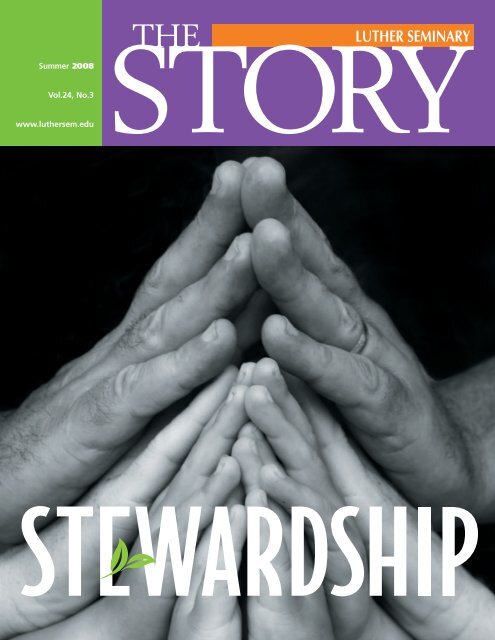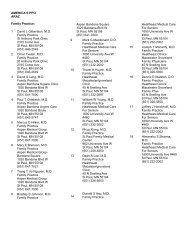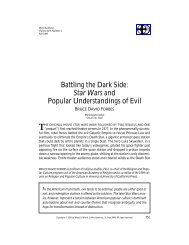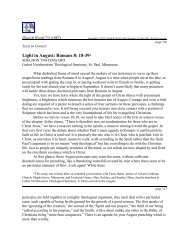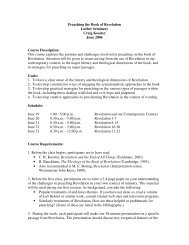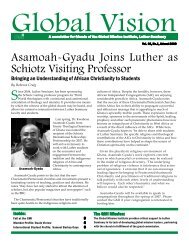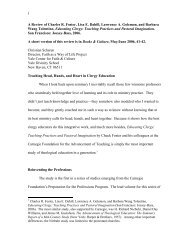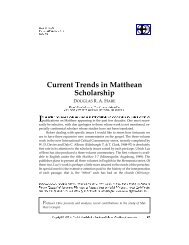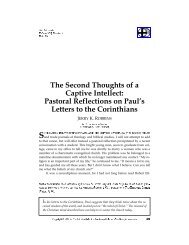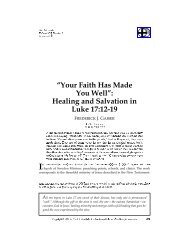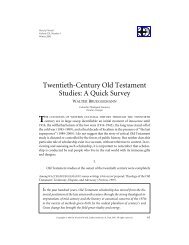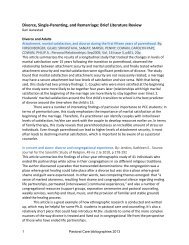Students - Luther Seminary
Students - Luther Seminary
Students - Luther Seminary
- No tags were found...
Create successful ePaper yourself
Turn your PDF publications into a flip-book with our unique Google optimized e-Paper software.
Summer 2008Vol.24, No.3www.luthersem.edu
Above: <strong>Luther</strong> <strong>Seminary</strong>'s Class of 2008 has some fun while taking the official class photo.Left: Graduating students and their families enjoy a farewell barbecue on the eve ofCommencement. Read about the 139th Commencement on page 17.Top left: Network administrator David Ottoson wraps himself in computer cords toadvertise <strong>Luther</strong>'s technology recycling event, held on Earth Day, April 22. Top middle:During two days each April, high school students visit <strong>Luther</strong> during Previews, an eventthat gives them a taste of seminary life and enhances their feelings of call. Top right:Donor Philip Friest and student Margaret Obaga dine together during Blessings, anannual event that brings together donors and the students they've helped. Right:Janet Ramsey, associate professor of congregational care and leadership, left, andPatricia Lull, dean of students, cheer on their team during the faculty/staff vs. studentssoftball game in May. Below: At Blessings, Lorraine Levandowski, second from left, poseswith granddaughters Taylor and Elizabeth Connell, middle, and the students who havebeen helped by her gifts, from left, Festus Alomaja, Andrew Jolivette and Laura Aase.
Notes from the Mission FieldMarked for Mission<strong>Luther</strong> <strong>Seminary</strong>’s strategic planis a response to the challengesthat face our church and world.It’s that important! Our focus is oneducating evangelical public leaderswho are capable of providing a hungryand needy world with a spirit-drivenapostolic witness. This high callingentails three important dimensions:We are called to be servants ofevangelical renewal;We are called to be heralds of hope;We are called to be catalysts forchange and mission.To help us communicate this importantmessage, we recently hired a consultantto assist in building a stronger publicidentity. At a presentation on how toeffectively communicate our vision,the consultant showed us a picture ofa young man with a Harley-Davidsontattoo on his arm. The consultantquipped, “You will know when yourmessage is being embraced whenpeople put your logo as a tattoo ontheir arms!”Suddenly, and to everyone’s amazement,one of the committee membersaround the table, a first-year M.Div.student at <strong>Luther</strong> <strong>Seminary</strong>, MichaelVinson, raised his hand. “In fact,” heresponded, “I do have a tattoo of<strong>Luther</strong> <strong>Seminary</strong>’s logo on my arm!”Michael lifted his shirt sleeve andshowed the <strong>Luther</strong> emblem proudly.There it was! He was marked!This moment revealed the depth ofGod’s call on all our lives as Christians.The Book of Revelation states thatwe have been marked by the crossof Christ. This mark or seal witnessesto ownership. God’s Word of Promisemarks us as being owned by theFather, Son and Holy Spirit. And yes,others may claim ownership of ourlives, as Revelation warns. But theTrinity’s mark is permanent; it goesright to the heart of our lives, andit calls us to be bold and faithfulwitnesses of Jesus Christ.As you read about the excitingemphasis on stewardship at <strong>Luther</strong>in these pages, remember that weare all called to be “servants ofChrist and stewards of God’smysteries” (I Corinthians 4:1).One of those mysteries is God’scall to be light, salt and leavenin the world.Student Michael Vinson,Master of Divinity junior,proudly displays the<strong>Luther</strong> <strong>Seminary</strong> logotattooed on his arm.We’ve been marked for mission.Help us steward this call!Pax,Richard H. BliesePresident<strong>Luther</strong> <strong>Seminary</strong>STORY Summer 20083
Our Savior’s<strong>Luther</strong>an SharesResources, Gifts WithMultiple CongregationsBy Shelley Cunningham, '98, M.Div.What’s the best course ofaction for a congregationseeking to make the most ofits resources: Renewal? Reimaging?Investing in the future?At Our Savior’s <strong>Luther</strong>an Church inEast Mesa, Ariz., it’s all of these things.The congregation is committed toraising up leaders who can draw ina new generation of believers. But ithas also found ways to revitalizeexisting ministries by sharing its giftsof leadership and volunteerism.“This truly is a stewardship issue!”Senior Pastor Mark Halvorson, ’73,said. “It’s a mission issue, of course,but it’s about stewardship in that weare trying to use both our financialand people resources in the bestway possible.”Change of scenery, thinkingWhen Halvorson came to Our Savior’sfrom Minnesota four years ago, he wasstruck by the differences he couldsee in the area.The church followed a typical “snowbird”pattern, with a predominantly seniorpopulation that grew considerably inthe winter months, as seasonal travelerssettled in, and got smaller in thesummer. Yet Halvorson soon foundthat “there was a real openness to trynew things within the congregation.So many had come from traditionalchurches in the Midwest. But there’ssomething about living in Arizonawhere you don’t have that sense of‘this is the way it’s always been.’”One seed planted by a previous pastorwas to start a new church. A numberof families at Our Savior’s made an18-mile drive to East Mesa fromthe neighboring community of GoldCanyon each Sunday. These familiesexpressed an interest in attendingchurch closer to home. But insteadof following the usual model ofbeginning a completely independentcongregation in that area, the OurSavior’s leadership team decidedto launch a second campus thatwould remain affiliated with thecongregation.“We started out worshipping in GoldCanyon in January 2003, and ourtotal outlay was just about $10,000,”Halvorson said. “You can’t start achurch with much less than that.”Still growingAttending the ELCA-sponsoredChurches Starting Churches, an annualconference for congregations withmultiple campuses, gave Halvorsonadditional ideas, resources and supportfor the venture. Over the last threeyears, the congregation has outgrownits Best Western hotel worship siteand moved to a new temporary site.They recently bought land in GoldCanyon and hope to move into apermanent home within the nextthree years.“One thing that helps us is we havea vision for ministry that is clear,and full of hope and excitement,”he said. “People can sense that, andthey just come on board.”Adding a campus is enough togenerate energy and growth for acongregation, but in the midst ofthe expansion another opportunitypresented itself. Epiphany <strong>Luther</strong>anChurch in Apache Junction, abouthalfway between East Mesa andGold Canyon, was failing. “They wereworshipping about 35 people inthe summer. The former bishop wasgetting ready to close the doors,”4STORY Summer 2008
Our Savior’s <strong>Luther</strong>an Church(continued)Halvorson said. “We saw a tremendousopportunity to revitalize an existingcommunity. One of our pastors, JohnBraaten, began interim ministry there.This coming January after the final vote,Epiphany will become a third campus.”Full circleHalvorson feels the ties of history withthis move, because Epiphany originallygave birth to Our Savior’s 24 years ago.Bringing vitality to three campusesmight seem a daunting task, butHalvorson said the congregation ismeeting the challenge.“It’s the Spirit at work. They cansense a newness, an excitement withall that is happening. People comingdown for the winter are saying, ‘Wehaven’t sensed this kind of thing inour other congregations for years.’”Lay people are intricately involvedin all aspects of ministry at the threesites, he said. Particularly at the GoldCanyon campus, volunteers are doingalmost everything: finding a placeto worship, coordinating logistics,organizing public relations in thecommunity, knocking on doors,inviting neighbors and friends.“The big thing we have to do is makesure we have enough pastors to goout and preach.”Looking forwardThat goal fits nicely with the otherpart of Our Savior’s commitment tofaithful stewardship: raising up leaderswho can guide the church into thefuture. This past year, Our Savior’shosted its first intern from <strong>Luther</strong><strong>Seminary</strong>. Another is starting thismonth. Ideally, in several years,Halvorson sees the three campusessupporting two interns.Mark Halvorson, ’73, senior pastor of Our Savior's <strong>Luther</strong>an in Mesa, Ariz.,is committed to stewarding multiple congregations.“It’s a healthy role for a congregationto view itself as a teaching parish,because we are developing newleaders,” he said. “It’s about more thanjust helping ourselves. It’s abouthelping the church into the future.”But Halvorson’s vision wasn’t justto focus on his own congregation.He worked closely with synod and<strong>Luther</strong> <strong>Seminary</strong> staff to develop apilot cohort for internship. It presentlyconsists of four Arizona congregations—Desert Cross in Tempe, Peace inGlendale, Central in Arizona City andOur Savior’s. The Phoenix cohortwill receive special assistance thisyear from <strong>Luther</strong> <strong>Seminary</strong> professorsCraig Van Gelder and Mary SueDreier of the Congregational Missionand Leadership division as theyexplore creative ways to grow thechurch.“When we [held interviews for theintern positions], we were lookingfor students who were excited to trynew things. Each setting is different.Only two have more than one pastor.Three are starting ministries atnew campuses.“If we want the church to growwith young people, then we haveto get younger pastors and leaders,”Halvorson said. “It’s very easy to growthe church down here with olderpeople, especially seasonally. And ourolder members are very generous anddo some fabulous ministry. But wesee that having younger pastors is akey thing for our future. Our bishop,Steve Talmage, has an incrediblevision for our synod that includesthis initiative.”Is it possible for a congregation toundertake so many different initiativesat once? Halvorson feels the moretime that passes, the more peopleare embracing the possibilities thatlie ahead. And that, in turn, has ledto a resurgence of energy and adeeper sense of what God is doingwith their gifts—exactly what goodstewardship is all about.“It’s really an exciting time down here,”he said. “We’re discovering what allgood stewards are experiencing:Being a missional church in the 21stcentury can be quite a lot of fun!” ●STORY Summer 20085
Donors Help <strong>Luther</strong><strong>Seminary</strong> SurpassFundraising Goals<strong>Luther</strong> <strong>Seminary</strong> will continue toplace a strong emphasis on reducingstudent debt and supporting studentsthrough scholarship support duringthe 2008-2009 fiscal year. The needfor scholarship gifts is so great that thegoal has been doubled to $2 million.It is a significant increase, but <strong>Luther</strong><strong>Seminary</strong> hopes and prays for ourdonors to again respond generously.By Laura Kaslow,Communication SpecialistShowcasing the strong supportof <strong>Luther</strong> <strong>Seminary</strong> donors, theSustaining Fund and ScholarshipFund again passed fundraising goals forthe year. During the 2007-2008 fiscalyear 6,474 donors gave generouslyto support the mission of educatingleaders for Christian communities.Strong support through two challengematches was instrumental in accomplishingthese goals.The Sander Seminarian ScholarshipMatch met its goal of $250,000quickly. Yet because they believeso strongly in scholarship supportfor church leaders, Duane andPhyllis Sander eagerly offered to goabove and beyond their $250,000gift for a total match of $311,000.Their generous gift and strong beliefin scholarship support was critical inhelping the seminary reach this goal.Through the combined support, theseminary was able to go above the$1 million scholarship goal, reachinga total of $1,170,851.The Sustaining Fund also successfullyreached the $4.5 million goal, largelydue to the Fox Challenge Match.The match was meant to encourageSustaining Fund donors to renewtheir gifts. More than 2,500 donorsresponded generously to the FoxChallenge Match. Of these, 707doubled their gift from the prioryear to have it matched entirely—quadrupling the gift impact. Anadditional 1,817 donors rejoined inpartnership and received a two-toonematch on their gift for a tripleimpact. <strong>Luther</strong> is grateful for all ofthese donors and for the generoussupport through these remarkablematching gift opportunities. ●As Christians, what is our most important stewardship responsibility?Sharing God’s love andcreation with all of God’screatures.Chris Zuraff, Master ofDivinity juniorProclamation.Justin Dietrich, Master ofDivinity seniorBeing intentional aboutpicking up after othersand yourself.Craig Wexler, Master ofDivinity internThat ourselves, our timeand our possessions are inharmony with God’s will.Marv Abrahamson,Doctor of Ministry studentin Biblical PreachingBeing good stewards ofhope—that unique Christianhope that often gets lostamidst secular conceptionsof hope.Chase Foreman, Master of Divinity juniorTaking care of the Earth.Tricia Christman, Masterof Divinity middler6STORY Summer 2008
Gifts from the Heart ProgramHonors Loved OnesBy Laura Kaslow,Communication SpecialistIf finding the perfect gift in honorof a special occasion feels like adaunting task, consider a Gift fromthe Heart. <strong>Luther</strong> <strong>Seminary</strong>’s Giftsfrom the Heart is a tax-deductiblegift program that will honor and/orremember a loved one while supportingthe seminary’s mission to preparestrong and effective church leaders.Whether in celebration of a specialoccasion or anniversary, or to markthe passing of a beloved friend, Giftsfrom the Heart are a way to honorloved ones through the continuationof God's work.fall celebration, persons recognizedthrough the Gifts from the Heartprogram will be acknowledged ina special print publication.Sending a Gift from the Heart issimple. Contact the Office of <strong>Seminary</strong>Relations to order your free giftpacket. Each packet contains a setof celebration and memorial greetingcards. Also included in the packetis a return card and envelope withwhich to mail your gift. Along withthe option of a print or electronicgreeting card, gifts may be madeonline at www.luthersem.edu/giftsfromtheheart. ●Reasons to give a Giftfrom the Heart• In memory of• Easter• Anniversary• Birthday• Housewarming• Wedding• Retirement• Christmas• OrdinationGifts from the Heart acknowledgesimportant life events. In honor ofthis, at <strong>Luther</strong> <strong>Seminary</strong>’s annualFor more information or to order a Gifts from the Heart packet, visitwww.luthersem.edu/giftsfromtheheart or contact the Office of<strong>Seminary</strong> Relations toll-free at 888-358-8437 or semrel@luthersem.edu.Give Green Program PromotesGood Stewardship of the EarthBy Laura Kaslow,Communication SpecialistAs Christians, we are called to begood stewards of the naturalresources that God has givenus. In Genesis 2:15 it is written,“The Lord God took the man andput him in the Garden of Eden towork it and take care of it.”<strong>Luther</strong> <strong>Seminary</strong> works equally to begood stewards of the Earth’s resourcesand of the resources that donors entrustto the seminary. To help fulfill thiscommitment, <strong>Luther</strong> created GiveGreen, a giving option that helpsreduce the use of resources such aspostage, paper and fossil fuels usedin transporting direct mail.Give Green is an opt-in programfor donors who prefer to receiveinformation electronically, it reducesthe amount of paper mailings theyreceive. Donors make gifts via oursecure Web site. By opting into theGive Green program, donors willbegin to receive most informationand communication electronically.“Green living is catching on in a bigway. I'm thrilled by this!” said CloEveDemmer, director of the SustainingFund. “God has commanded us totake care of the world in which welive. Give Green is a way donors canchoose to reduce paper resourceswhile helping <strong>Luther</strong> better stewardthe resources our donors faithfullyentrust to our care.” ●Are you ready to enroll in Give Green?Go to www.luthersem.edu/givegreen and sign up today.STORY Summer 20087
Pampered Chef FounderRelates Mission ofBusiness, PhilanthropyBy Kelsey Holm, Communication SpecialistDoris Christopher is manythings: mother, daughter, entrepreneur, steward. Here,she discusses how all these roles have woven together toform a remarkable life of service. On June 26, Christopherwas the featured speaker at <strong>Luther</strong> <strong>Seminary</strong>’s Womenin Philanthropy Tea.Was there a certain person in yourlife who inspired your own journeyas a steward and philanthropist?I think I have to say my parentscertainly were key in all of that. Mydad had his own business—a smallbusiness. For all of my life he ownedhis own gas station, and he was anauto repair mechanic, so that wascertainly something I saw firsthandin my life. My mom, too, was anincredible role model. She workedfull time for most of my life—andthat was unusual in those days—andyet she still did it all. She made suremy sisters and I were very well takencare of. In all of this, my parentswere not wealthy people, but theymodeled for us the importance ofgiving back, mostly to the church.We grew up with a strong model ofthat in our lives.How does faith guide your givingand your business life?I think faith is at the core of how Ilive my life and again goes back to theway I was brought up. My husbandgrew up with a similar set of valuesand strong faith from his parents. Bothof us are very unified in our beliefthat we are stewards of whatever it iswe have here. It’s our responsibilityto give back in any way we can andalso to model faith-based stewardship.We instilled our values in the businessas we started the company.What inspired you to startThe Pampered Chef?I would say my family, for a coupleof reasons. I really went back to workbecause I felt it was an importantthing for me to do. I had a wonderfuleducation that my parents madepossible, and I felt I needed to usethose talents that I had developed attheir urging. I also had the exampleof my mom working that enabled meto see how to be a working mother.For the benefit of my family, I wantedto use my talents and skills in ameaningful way, and I wanted to bethere as a mom and a wife. I wantedthe joy of supporting my family.That’s what prompted me to find adifferent way to work, to allow meto prioritize my family time-wise,and that became the origin of ThePampered Chef concept.How did you decide to build philanthropyinto The Pampered Chef?From the time that our business wasreally profitable, we started programsthat allowed us and our consultants togive back, almost from the beginningof the business. We allowed peopleto have local fundraisers and use thebusiness as a launch pad. When wehit $1 million, we realized that thiscompany was blessed beyond whatwe expected. We also realized thatthis was not because of us, but becauseso many people had contributedtheir time and talent, and they wereinspired by the concept of what wewere doing. During the late ’80s, westarted to get our heads above water.We were a growing business and wantedto do something in an organized,focused way. At that time we chosethe first of three charitable programs.The first one we launched in 1990.It is a longstanding partnershipwith America’s Second Harvest—The Nation’s Food Bank Network.8STORY Summer 2008
Doris Christopher Interview(continued)We started small and grew over theyears. So far we’ve raised more than$13 million for America’s SecondHarvest, and it’s growing at a fast rate.The second program is a partnershipwith the American Cancer Society,where we sponsored education forearly detection and education for breastcancer. That started in 2000 and we’veraised more than $6.5 million to datefor ACS. (The consultants) were veryinvolved in selling the product anddoing fundraiser shows contributingdirectly to those charities. The thirdone is a little bit different. I’m agraduate of the University of Illinois,and they had started a wonderfulfamily resiliency program. We adoptedthem as a charity [in 2000], tosupport research, fellowships anda lecture series. It’s focused onbuilding strong families in the faceof today’s challenging world.Why is it important to you to share yourexperiences with women in philanthropygroups like the one at <strong>Luther</strong>?I think it’s important as a woman inbusiness to mentor in a lot of differentways, and one of them is to talk aboutstewardship. I believe one of thethings we do when we give is set anexample for others.Describe the most satisfying philanthropicgift you ever made. What about itmade it so satisfying?So many of the things we do arewith faith-based organizations. It’s areally strong principle in my life andin the giving we do. The other I thinkof as sort of a legacy kind of gift is inworking with University of Illinois inthe family resiliency program. I believethat has the potential to strengthenthe family unit. It was important inmy own life, and probably one ofthe most important responsibilitiesin my adult life is to nurture my ownfamily. To be part of the researchand teaching, and to support thoselearning and becoming future leadersin the area of family development—that’s a legacy and I think that will besomething that will help our childrenand grandchildren and generationsto come.What advice would you give toa young woman starting out as anentrepreneur today?I think the most important thing foranybody—young or old—is to reallybe clear about what it is that youthink is your purpose in life. At thevery most basic point of choosingyour career, be as clear with yourselfas you can about what drives youand really gives you joy. If you’reable to land in a business or careeryou find joyful, then you’re settingyourself up for the rest of your lifeto have fun, not work. That’s theequation for success.What advice would you give to ayoung woman seeking to begin orimprove her charitable giving?I think again you have to go withwhat tugs at your heart. Of all theopportunities you hear about—andwe know there are many—what arethe things that keep coming backinto your mind in which you feelyou can make a difference? What doyou feel really is in line with yourlife’s purpose and mission? Otheradvice is to give as soon as you canand give as you are able. It doesn’thave to be a huge gift, but there issuch joy in giving.Who are your role models, and why?The first and best role models in mylife were my parents, and then I wouldgo on and say my husband’s parents.In the important values of lifethey were very similar, butin the manifestations they were verydifferent. My parents were basic andhardworking. They didn’t have a lotof wealth. My mom was a basic cookbut a good cook, and she cooked allthe time for her family. My motherin-lawwas an incredible cook and shealso loved to entertain. She delighted inputting together beautiful, interestingmenus. She kind of tapped into mycreative juices and my mother tappedinto the importance of being steadywith the everyday kinds of things.I was incredibly blessed by thesetwo women. ●STORY Summer 20089
Internship SupervisorMark Johnson Retires;Former Interns Reflectwith GratitudeBy Meta Herrick, ’08, M.Div.Internship can play a significant rolein the life and call of an M.Div.student. Academics and classroomlearning are consistently paired withcontextual learning throughout thedegree program, but internship is aunique opportunity for students toleave campus for a congregationalsetting that asks them to considerministry in new ways. Questionsand discernment concerning theprofessional and personal are exploredmore fully and students return forsenior year transformed.Several congregations around thecountry have long-standing internprograms, bringing a student into theirchurch and community year afteryear. These programs thrive becauseparishioners embrace the opportunityto teach and be taught while gettingto know each individual intern overthe course of a year. <strong>Students</strong> seekout these programs because theyprovide an important relationshipwith an experienced supervisor.Mark Johnson, ’72, recently retiredpastor and intern supervisor at First<strong>Luther</strong>an Church in Mount Vernon,Wash., is remembered as a mentorand strong example of a parish pastorand theologian by many former interns.Three of these former interns wereable to share their memories ofinternship and how it helped shapetheir vocations.Rolf Jacobson is an associate professorof Old Testament and Karoline Lewisis an associate professor of BiblicalPreaching at <strong>Luther</strong> <strong>Seminary</strong>. KristenJacobson is associate pastor at Central<strong>Luther</strong>an Church in Minneapolis.What is your fondest memory ofinternship with Mark?Kristen Jacobson: He’s authentic. Hekept up with everything else he hadgoing on while teaching me. If I wasstruggling, he always had time for me.Rolf Jacobson: He tailored the learningexperiences to both the strengths andthe weaknesses of the intern. I washaving trouble with the confirmationclass at the beginning of the year andhe arranged an opportunity for me10Kristen Jacobson, ’96, associate pastor,Central <strong>Luther</strong>an Church, MinneapolisRolf Jacobson, ’91, associate professorof Old TestamentKaroline Lewis, ’94, associate professorof Biblical PreachingSTORY Summer 2008
Mark Johnson Retires (continued)to meet with and learn from localjunior high teachers. He helped mefocus on that so it could become anarea of excellence.Karoline Lewis: For the first month ofinternship, we spent most afternoonsvisiting parishioners in their homes.We spent time with those who weresick and shut in, but he also took me tosee [healthy] members he wanted meto know, integrating me immediatelyand making me part of the community.This helped me connect names andfaces more quickly on Sunday mornings.Pastoral care was an insecurity of mineand he addressed this immediatelyby teaching me that pastoral care ispart of everything I’ve learned andwill do as a pastor.Did the long-standing intern programat First <strong>Luther</strong>an intimidate you? Wasit hard to make mistakes?KL: I never felt competition withMark’s former interns because he knewmy strengths and weaknesses andgave me opportunities to discovermy own pastoral identity. He createdmoments to throw you into yourweaknesses, working with you tofashion a well-rounded pastor.What did you admire about Mark’sleadership while you were an intern?RJ: Mark was the model for parishpastor as theologian, working withthe Greek text all week, reading andalways learning.KJ: He rode through the hot issuesalongside you and was a genius when itcame to diplomacy. I didn’t recognizehow great he was at teaching me then,but later I would look back and think,“Oh yeah. Mark taught me that.”RJ: Yes. I didn’t realize that vocationalformation was happening until I cameback for senior year.KJ: I learned a lot about my internshiponce I came back to seminary andwas surrounded by my classmatesagain. He let me preach half thetime. When I came back for senioryear, I found that this was rare andthat most supervisors don’t do that.He trusted me enough to let me tryand taught me by telling the truth.KL: <strong>Seminary</strong> was teaching me topreach and lead Bible studies, butinternship took these different partsof ministry and showed me thateverything is integrated.How did internship shape and formyou for your call to ministry?KL: Theology is not only in yourhead, but it is incarnational. It is theembodiment of Christ.RJ: Internship was an important yearfor me. It was the most important yearof my education.KL: Without internship, I don’t knowif I would have gone into the parish.I knew I wanted to go to graduateschool and I wanted to teach, butinternship changed my scope, givingme a new understanding of pastoralcare and my identity. I rememberthinking, “Yeah, I do want to dothis. I do have a calling to this.”It was affirming.What makes a good internship? Howare students best teaching and taughtin relationship with their supervisorand congregation?RJ: The congregation knew that theywere teaching the intern. They didn’tuse me as cheap labor but held meup and supported me. They weremy advocates.KL: A well-rounded internshipexperience addresses the strengthsand weaknesses of the intern, helpingto show how each area of studyand experience work together. Beinggiven the opportunity to do all kindsof things creates a pastoral identityand Mark gave us room for thatexploration. A supervisor and congregationcan help the intern taketime for reflection on the largerwhole, not just for personal critique.It’s not all about us. Internship putsus into a relationship and experiencethat is bigger than ourselves. ●STORY Summer 200811
Brothers Jerry andDavid Hoffman ShareStewarding GeneThe Hoffman family in a1950 photo. Clockwise fromleft: Harold, Jerry, Evelynand David.Pastors Jerry and DavidHoffman today.12By Mary Brown, '91, Associate Directorof The Center for Biblical PreachingWhen pastors Jerry and DavidHoffman talk about theirupbringings, they each say,“If you don’t have time to worship,you are busier than God ever intendedyou to be.” This motto of their mother’sprofoundly shaped them into theChristian leaders they have become.Born and raised on a small farm nearStorm Lake, Iowa, the Hoffmans say,“Our parents attended church everySunday. At our table, the Bible wasalways there. Devotional books wereread and prayers were said at thattable every day. And around thatsame table we talked about currentevents and what was happening allaround us. We learned from thebeginning the mutual responsibilitywe have for one another.”Like most small farms, there was noshortage of work to be done. Both boyswere entrusted with a lot of responsibilityat an early age, learning to drive a tractorat age 7 and writing checks on thefarm account as teenagers. Lessons onthe farm became the fertile groundthat God used to prepare each ofthe Hoffmans for pastoral ministry.Jerry HoffmanIt was on the farm that Jerry began“preaching to the weeds.” Even as aconfirmation student, he alreadysensed the Holy Spirit leading himtoward pastoral ministry. After graduatingfrom Augustana <strong>Seminary</strong> inRock Island, Ill., Jerry served parishesin Louisville, Ky., and Michigan City,Ind., before becoming an assistant tothe bishop for the Indiana-KentuckySynod of the <strong>Luther</strong>an Church inAmerica. He took a call as seniorpastor at Nativity <strong>Luther</strong>an Churchin St. Anthony Village, Minn., andserved there for more than 20 years,retiring in 1999.In 2007, Jerry became the directorof <strong>Luther</strong> <strong>Seminary</strong>’s Center forStewardship Leaders. Its mission is toequip stewardship leaders for Christiancommunities. The Center encourages theintegration of stewardship educationthroughout the seminary curriculumwhile providing focused financialstewardship courses. Extra-curricularopportunities assist students in theirexpression of faithful stewardshipthrough personal financial management,including the volunteer services ofpersonal financial stewardship coaches.The Center promotes continuingstewardship education for churchleaders. Resources are posted onlineand a weekly newsletter is sent to morethan 2,600 subscribers via e-mail.David HoffmanIt wasn’t until David was a student atthe University of Iowa that his mentor,Dr. George Forell, perceived the giftsDavid had for church leadership andencouraged him to “give seminary a try.”David enrolled at <strong>Luther</strong>an Schoolof Theology at Chicago and aftergraduation served parishes in upstateNew York before becoming seniorpastor of St. Philip the Deacon inPlymouth, Minn. Under his leadership,St. Philip the Deacon has grown toa congregation of more than 4,600members, with an annual budget of$3,200,000. Of that, $650,000 is setaside to support mission work aroundthe world.Vein of stewardshipBoth brothers share a passion for theministry of stewardship. “Stewardshipis a way to say thank you to God forall God has given to us,” David says.“One of the challenges in humannature is to say, ‘It’s all mine.’ Theministry of the pastor is to (helpyour people) expand their vision forsharing all God has given to them.”Jerry agrees. “Most of the time whenmoney is talked about within thelife of the church, it’s for survival.However, we need to integrate thetopic of money with all aspects ofpeople’s lives. It’s not even justabout giving 10 percent. God hasgiven us 100 percent of what wehave. Faithful stewardship is aboutthe way we live our whole lives.”When discussing the topic of money,the concern in Jerry’s voice is clear.STORY Summer 2008
Jerry and David Hoffman(continued)“Money enslaves so many,” he says.“Many in our congregations are just twopaychecks away from losing it all becausethey live right up to the financial edge.But Christian stewardship can set usfree from all of that.”Leading by example“One of the things my staff learns isyou cannot ask others for a gift if youare not giving yourself,” David says.Pastors also need to learn how to askothers to give. At David’s first parish,he went to visit a dying woman. Hedidn’t know her well; he had been inthe church less than a year, when sheasked, “Pastor, what is the mortgageon the building?” When he told herit was $600,000, she said, “I wouldhave gladly given that but they neverasked.” She died the next day. Daviddecided he never again wanted a giftto the church to go unrealized.In describing the significant growthof St. Philip the Deacon, Davidcredits church leaders for remindingmembers of how their gifts make adifference. The congregants havegenerously supported seven capitalappeals during David’s tenure. Whilea portion of each campaign has beenused for “bricks, mortar and mortgage”at the Plymouth location, there hasbeen a significant mission componentin every one. Recent projects includebuilding a church in Madagascar, ahospital and school in Tanzania, anda dormitory in India.their colleagues and staff. They aregreat examples that good leadersmake a difference.”David has been faithful in stewardingthe calls of those who serve aroundhim, with three of his executivepastors going on to serve as seniorpastors in large congregations.Chris Nelson, senior pastor ofBethlehem <strong>Luther</strong>an Church inMinneapolis, served with David in twocongregations for a total of 14 years.“There is no one else like David in thechurch,” remarks Nelson. “He is one ofthe most personally secure pastors IJohn Hogenson, ’87, left, and ChrisNelson, right, visit with former mentorDavid Hoffman.know. He taught me that when anotherstaff person shines, we all shine.”Pastor John Hogenson, ’87, recentlymoved from an executive pastor role atSt. Philip the Deacon to a lead pastorposition at St. Andrew’s <strong>Luther</strong>anChurch in Mahtomedi, Minn.“I wouldn’t be here today withoutDavid’s influence in my life,”Hogenson says. “I learned fromhim what it meant to be a generousleader. It was also David who taughtme how to make good and rightdecisions for the whole.”Though sad to see staff memberslike Hogenson and Nelson leave,the congregation at St. Philip theDeacon views it as a way to offercritical support to the church atlarge, where senior pastor vacanciesare increasing.“Stewardship and evangelism gohand-in-hand,” David says. “Faithfulstewardship is contagious. We arehere to take hold of all the thingsGod has given to us and rejoice inevery one of them.” ●Learn more about <strong>Luther</strong> <strong>Seminary</strong>’sCenter for Stewardship Leaders!The mission of the Center for Stewardship Leaders is to develop the capacities of <strong>Luther</strong><strong>Seminary</strong> to equip stewardship leaders for Christian communities. The center offers:• Financial stewardship courses.• Ways for students to express faithful stewardship throughpersonal financial management.• Continuing stewardship education for church leaders.Stewarding the churchBishop Craig Johnson of theMinneapolis Area Synod, where thebrothers are rostered, says, “PastorsJerry and David Hoffman have led theirrespective congregations in an exemplaryway. They have been innovative, strategicand have encouraged leadership inSTORY Summer 2008The center promotes and teaches stewardship through its Web site,www.luthersem.edu/stewardship. The site provides:• Free subscriptions to Stewardship for the 21st Century, a weekly e-mail newsletter.• Valuable resources including articles, videos, Bible studies, book reviews and sermons.• Support and encouragement for parish pastors and congregations.Jerry Hoffman serves as the director of the Center for Stewardship Leaders.www.luthersem.edu/stewardship13
Fund Teaches Stewardship,Fiscal Education14by Allison K. Schmitt, ’07 M.A.Minus 16. It may sound likethe temperature on a briskMinnesota morning, but it’sactually a much more chillingstatistic: Negative 16 percent is thecurrent savings rate of young adultsages 25 to 34, according to ShareSave Spend, an organization dedicatedto helping youth and adultsdevelop and maintain healthymoney habits.The majority of <strong>Luther</strong> <strong>Seminary</strong>’srecent Master of Divinity graduatesfall within this negative savingsdemographic. Couple that withsubstantial student loan debt andthe need for financial educationamong pastors-to-be is clear.Financial educationThat’s why <strong>Luther</strong> <strong>Seminary</strong> createdthe Fund for Financial Leadership.Made up of gifts totaling $1.25million, which were matched byan anonymous couple and addedto existing stewardship dollars, the$3 million fund makes possible avariety of financial education activitiesat the seminary. These activitiesare overseen by the Center forStewardship Leaders, directed byJerry Hoffman.Student focusWhile Center resources areavailable to a wide demographic,students are the main focus. Thefinancial stewardship coachingprogram pairs students with coacheswho encourage them to practicefaithful financial stewardship. In thelast academic year, 50 partnershipswere made. Hoffman said theprogram has evolved from focusingon transactions such as budgetsand credit cards to consideringvalues and stories.Do you know someonewho feels called to ministry?Ventures in Vocation is an opportunity for college-age students andpost-college professionals to consider God’s call to ministry and therole seminary study plays in that calling. During the two-day conference,participants will:• Get a glimpse into <strong>Luther</strong>’s community life.• Experience the quality of seminary teaching and learning.• Meet faculty and students.• Receive information about admissions,financial aid, housing and candidacy.• Explore their personal calls to ministry.Oct. 12-13, 2008Ventures in Vocation • <strong>Luther</strong> <strong>Seminary</strong>www.luthersem.edu/admissions/ventures • 1-800-LUTHER3Plans are underway to includea four-hour “Faith and Money at<strong>Luther</strong>” workshop for new studentsat orientation. The Center also seeksto integrate stewardship lessons intothe seminary curriculum. Learningopportunities for interns include ashort financial stewardship workshopand an annual stewardship sermoncontest. Thrivent Financial for<strong>Luther</strong>ans also made a gift thatwill allow students to have theexperience of managing endowmentsand making spending decisions.Continuing educationThe KAIROS course “Talk–Walk–Lead: Equipping Stewardship Leadersfor the 21st Century Church” presentsa biblical view of stewardship, andthe Center’s Web page offers anumber of inspirational resources,including “Living in Abundance,”lessons on generous living from<strong>Luther</strong> <strong>Seminary</strong> faculty members.The Center offers a weekly e-mailnewsletter on stewardship topicsand a searchable database thatcan be accessed on the Web site,www.luthersem.edu/stewardship.Hoffman’s work also includesinteracting with the Stewardshipfor Life Institute in Gettysburg, Pa.,the Ecumenical Stewardship Centerin Indianapolis, Ind., and focusgroups in local ELCA synods. ●STORY Summer 2008
Recent Graduate Puts Cross-Cultural Program to the TestBy Meta Herrick, ’08, M.Div.<strong>Students</strong> are often drawn to <strong>Luther</strong><strong>Seminary</strong> because they hearabout a program that connectswith their deepest callings as servantsof Christ. When Linda Webster, ’08,compared seminaries, she noted theabundant potential for cross-culturaleducation flourishing at <strong>Luther</strong>.Webster ended up taking full advantageof that potential after deciding toattend <strong>Luther</strong>. In May 2008, shereceived a certificate of achievement“in recognition of the completionof the most cross-cultural learningopportunities of any student in thehistory of <strong>Luther</strong> <strong>Seminary</strong>’s crossculturalprogram.”“All I can say is that when God putssomething into your heart, into yourbeing, you need to follow it, thoughyou may not understand anythingabout it at the time,” she said.The right placeWebster was eager to meet RodMaeker, recently-retired director ofthe cross-cultural program, when shearrived on campus for her junioryear. He confirmed her impressionsabout <strong>Luther</strong> <strong>Seminary</strong>, a schoolthat has encouraged her to connecther biblical and theological learningto contextual and multiculturalexperiences. This initial conversationintroduced Webster to severalopportunities, including <strong>Luther</strong>’saffiliation with Pine Ridge IndianReservation in South Dakota.The pastor at her teaching parishwas extremely supportive of the callWebster was discerning. One of herfirst courses at <strong>Luther</strong> was an introductorycross-cultural seminar.“We tackled hard issues in that class,like racism,” Webster said. “This classhelped prepare me and inspire meto seek out so many cross-culturalopportunities at <strong>Luther</strong>.”Webster spent time at Pine Ridge twiceduring seminary, and learned aboutborder and immigration issues in El Paso,Texas, and Juarez, Mexico. She traveledto South Africa to encounter peoplestricken by HIV/AIDS, still recoveringafter the formal end of apartheid.Webster has been inspired by the saintsof El Salvador and Guatemala,standing where they stood firmly forthe poor and oppressed. She criedfor Israel as walls were being builtinstead of torn down.A log church in Rocky Boy, Mont.A new perspective“I think I have been a champion ofthe underdog most of my life, but<strong>Luther</strong> called me to see things withnew eyes and to look at the worldwith a sense of justice. I continueto be challenged to ask the age-old<strong>Luther</strong>an question, ‘What does thismean?’ in new contexts.”Webster has been called to serve OurSavior’s <strong>Luther</strong>an Church on theRocky Boy Reservation in Montana.“I have come full circle since myfirst experience at Pine Ridge. It wasthere I started to learn what it meansto walk with and accompany peopleinstead of trying to fix a problem. It wasthere I started to learn what it meansto listen to other people’s storiesinstead of having to talk myself.”At Our Savior’s she will develop adeeper sense of call, borne out of theopportunities for study and experienceshe found at <strong>Luther</strong> <strong>Seminary</strong>.“Each of my experiences has enrichedme in some way and filled me withfaith, hope and love. This growth isnot just for me, but for the sake ofthe church.” ●STORY Summer 2008Linda Webster, left, with a group ofcross-cultural learners in Juarez, Mexico.15
Incarnation <strong>Luther</strong>an Committed toNurturing Culture of StewardshipBy Shelley Cunningham, ’97, M.Div.church. I just want to talk with themabout what it means to live richly outof God’s abundance. We talk abouttheir faith story and what brought themto this place, what their values are, andwhat and who shaped those values.”16Where does a generous spiritcome from?In some people, it’s a natural part of whothey are. But for many, it is cultivated—through example, encouragementand time. Rev. Glenn Taibl, ‘72, ofIncarnation <strong>Luther</strong>an Church inShoreview, Minn., sees the congregationas a primary means by which thosespirits can be nurtured. His call aspastor for stewardship ministriesreflects his—and his church’s—commitment to that work.Focus on stewardshipIncarnation’s senior pastor, GaryMedin, ’78, created a staff positiondedicated to issues of giving andstewardship about a year ago.The call was crafted so that in additionto preaching and pastoral care, morethan 50 percent of Taibl’s time isspent on stewardship issues. “I seethis as an emerging position, thatmore and more congregations willbe [staffing like] this,” Taibl said.The call is a perfect fit for Taibl’s giftsand passions in ministry. He spent26 years as a parish pastor beforejoining the staff of <strong>Luther</strong> <strong>Seminary</strong>’sOffice of <strong>Seminary</strong> Relations as aphilanthropic adviser. There, it washis goal to develop relationshipswith donors and encourage them tofinancially support the seminary. Butafter eight years at the seminary, he feltGod calling him back into the parish.“In the course of my career [at <strong>Luther</strong>]I met some incredibly beautiful,generous people,” Taibl said. “WhenGlenn Taibl, '72, spends 50 percentof his time fostering stewardship atIncarnation <strong>Luther</strong>an.I’d ask them, ‘Where did you learngenerosity?’ most would point tosomething that had happened in theirhome—from watching their parentsor grandparents and absorbing theattitude with which they gave.Creating imagination“Sometimes I’d visit someone whohad a big capacity to give—lots ofmoney, plenty of interest, but theydidn’t have that DNA of generosity.They couldn’t imagine letting goof what they had. I’d walk awaywondering, who is going to leadthem into that imagination?”Taibl’s role at Incarnation is to help letloose that imagination. “We probablyhave 10 to 20 percent of our people wholive out of this spirit of generosity. Mygoal is to intentionally try to open thatup for a few more people every year.”This happens, he says, by buildingrelationships. Though Taibl has onlybeen on staff at Incarnation for a year,he and his wife, Rebecca, have beenmembers for close to a decade. Therelationships he established over timehave helped him in earning the trustit takes to begin these conversations.“When I meet with people, I start bytelling them I’m not trying to solicitthem into giving more money to ourBroadened horizonsSince not everyone is ready to sitdown for a one-on-one conversation,Taibl is developing programs that makestewardship a broader part of the cultureat Incarnation. He has developed apersonal financial management group,classes for teens and young adults, anda series of “talkback sessions” focusedon money and faith. He’s encouragedby an overwhelmingly positiveresponse from the congregation.“When you start to talk about faithand money, you really do stir up thebottom. But we have to start theseconversations for things to bringabout change.”He’s also the first to admit that his timecultivating relationships for <strong>Luther</strong><strong>Seminary</strong> has been an incredible asset,both professionally and personally.“I have learned a great deal from thegenerosity of the people who supportthe school. Their vision and hope forthe future is something that inspiresme to be generous.”Taibl subscribes to author MarkTaylor’s definition of stewardship as“the organizing of our lives so thatwe can give ourselves away.”“It’s really the management of ourlives with Jesus at the center,” hesaid, “especially how it impacts ourrelationship to God, others, ourselvesand creation. When we becomegivers, we are opened up to a wholenew dimension of the faith journey.That’s what I want to help peoplediscover for themselves.” ●STORY Summer 2008
Commencement Honors170 New GraduatesBy Kelsey Holm,Communication Specialistresponder, Bruce Lerum, M.Div.,explained the unique situation.<strong>Luther</strong> <strong>Seminary</strong> bestowed degreeson 170 students at the 139thCommencement on May 24 atCentral <strong>Luther</strong>an Church in Minneapolis.Rolf Jacobson, '91, associateprofessor of Old Testament, gavethe commencement address. Hereferenced the day’s stormy forecastin his sermon.“The rain today is fitting,” Jacobsonsaid, “because it fell not only on us,but on the grass and flowers in frontof Bockman Hall and on the crossthat seems never to change eventhough the seasons do. Though therain might dampen our day, it alsocauses life to sprout and grow. Likethe word you will proclaim whereveryou go, it does not return empty, itaccomplishes that which God purposes.It waters the Earth, gives seed to thesower and bread to the hungry.”A unique aspect of this year’scommencement was the presenceof two student responders wherethere is usually only one. The first“I wasn’t the original choice to speaktoday. Another was chosen,” he said.“Instead of being here, we thought hemight be in a hospital room, continuingto heal from leukemia and a bonemarrow transplant three months ago.Instead, he received a hall pass toleave the confines of his hospital roomfor a short time to be here and sharewith us. Once again, the power ofprayer in Jesus Christ continues todisplay the authority it holds.”Master of Arts graduate Emily Myallis ishooded by Mary Hinkle Shore, associatedean for first theological degree programs.Lerum referred to Scott Nocton,M.Div., who spoke to his fellowgraduates and their loved ones froma wheelchair at the altar. He saidthe graduates had become like family,and the fact that they were workingStudent responder and M.Div. graduateScott Nocton receives his diplomafrom President Richard Bliese.together to spread the gospel madehim proud to be part of the group.He said, “It’s hard for me to be uphere having finished and having gonethrough what I’ve gone through, butwhat I realized through this is nomatter what the circumstance is, thecall still plays itself out. That should bea reminder to all of us, that no matterwhat your degree is, no matter whatyour position is in life, there are peopleout there who need to hear the gospel.And that’s where we all come in.”The service also recognized threeretiring faculty members: James Boyce,Marc Kolden and Rod Maeker. Alsohonored were graduates receivingawards for excellence. They included:• The John Milton Prize in OldTestament given to ChelseaDeArmond and Joseph ArnoldHilgenkamp.• The A.E. Hanson Prize in Homileticsgiven to Meta Saunders Herrick,Kelsay Olivia Parker andDaniel P. Ruth.• The G.M. & Minnie Bruce Awardin New Testament given to JosephArnold Hilgenkamp.• The Graduate Preaching Fellowshipgiven to Travis Steven Gerjets.STORY Summer 2008A group of graduates smile for thecameras as they wait to process intothe auditorium.17
E V E N T C A L E N D A RProdigal Son BookReceives AwardsChurch in Public Life LectureOct. 1Chapel of the IncarnationMark Hanson, presiding bishop, ELCA“Christians and Citizenship inElection Time”www.luthersem.edu/lectures/church_public_life/Ventures in VocationOct. 12-13<strong>Luther</strong> <strong>Seminary</strong>For post-college professionalsand college-age students interestedin seminary.www.luthersem.edu/admissions/venturesWord & World LectureOct. 15Chapel of the IncarnationEllen F. Davis, professor of Bible andpractical theology, Duke Divinity School“A Theology of the Land”www.luthersem.edu/lectures/wordworldSinging the FaithOct. 26Chapel of the IncarnationNordic Choir, <strong>Luther</strong> College,Decorah, IowaAndrew S. Burgess LectureNov. 5Chapel of the IncarnationJonathan J. Bonk, executive director,Overseas Ministries Study Center“The Gospel and Ethics Revisited:Pre-Christendom Faith in a Post-Christendom World”www.luthersem.edu/lectures/burgessAbook honoring a collectionof artwork gifted to <strong>Luther</strong><strong>Seminary</strong> has won two 2008Independent Publisher Book Awards.“And Grace Will Lead Me Home:Images of the Prodigal Son from theJerry Evenrud Collection” received abronze medal in the art book category.Selected as one of the outstandingbooks of the year, it also received abronze medal in the most originalconcept category.“And Grace Will Lead Me Home,” byRobert Brusic, <strong>Luther</strong> <strong>Seminary</strong> pastoremeritus, <strong>Luther</strong> <strong>Seminary</strong>, featuredprodigal son-themed artwork that hasbeen gifted to the seminary by artcollector Jerry Evenrud. It was publishedby <strong>Luther</strong>an University Press,an imprint of Kirk House Publishers.Order a copy of “And GraceWill Lead Me Home” from the<strong>Luther</strong> <strong>Seminary</strong> Bookstore,www.luthersem.edu/bookstore. ●Continue Your Education with Lay School ClassesInformal, non-credit classes taught by seminary professors forlay persons who want to learn more about matters that relateto their Christian faith and life.Making Faith Sense in Times of ElectionNoon-2 p.m. MondaysFaculty: Mary Hess, associate professor of educational leadershipGary Simpson, professor of systematic theologyGospel of Mark7-9 p.m. Mondays (webcast available)Faculty: Sarah Henrich, professor of New TestamentDesert Spirituality7-9 p.m. MondaysFaculty: Lois Farag, assistant professor of early church historyAll fall classes are held Sept. 15-Oct. 13. To attend Gospelof Mark via webcast you will need a high-speed Internetconnection. For class descriptions or to register, visitwww.luthersem.edu/layschool. For more information,call 651-641-3416 or e-mail kairos@luthersem.edu.Register Now For Upcoming KAIROS Courses!www.luthersem.edu/kairosContinuing education opportunities for pastors, associates inministry, diaconal ministers and lay leaders.August18-20 Discover Your Call—Dependable Strengths for CongregationsSeptember18-19 Discernment for the Practice of Intentional Interim Ministry22-24 Process Preaching: A System for DeliveringExtemporaneous Sermons29-Oct. 3 Building Caring CongregationsOctober6-10 Annual Lectionary Study: The Gospel of Mark13-14 The Evangelical Prophet: Preaching Isaiah From Advent toEpiphany with instructor Ellen F. Davis15-17 Christian Ministry and the Phenomenon of Islam20-21 Spirit and Culture of Youth Ministry: An Introduction22-24 PR for Churches27-31 Intentional Interim Ministry Training – Phase 118STORY Summer 2008
Karoline Lewis, ’94, assistant professorof Biblical Preaching, contributed“‘Shepherd My Sheep:’ Preachingfor the Sake of Greater Works ThanThese” to the summer 2008 issue ofWord & World. On May 21, she was aworship service presider for Festivalof Homiletics, Westminster PresbyterianChurch, Minneapolis. She served as aleader at a women’s retreat at DiamondLake <strong>Luther</strong>an Church, Minneapolis,from April 4-6. On March 9 and 16,she conducted an adult forum on“The Passion According the John”at Westwood <strong>Luther</strong>an Church,St. Louis Park, Minn.Lois Farag, assistant professor ofearly church history, presented “TheChurch of Alexandria and RomanLaw” at the May 17 conferenceCoptic Culture: Past, Present andFuture, held at the Coptic OrthodoxChurch Centre in England.Rolf Jacobson, ’91, associate professorof Old Testament, served as a guideand mentor at a pre-tenure workshopheld June 10-15 at the Wabash Centerfor Teaching and Learning in Theologyand Religion, Crawfordsville, Ind.He served as a Bible study leader atthe St. Paul Area Synod Assembly,May 30-31. He edited “Crazy Talk:A Not-So-Stuffy Dictionary ofTheological Terms,” published inApril by Augsburg Fortress.Mark Granquist, visiting professorof church history, presented “WhatWe Have Learned About Augustana:Notes From the Writers of the NewHistory of the Synod” at the biennialmeeting of the Augustana HeritageAssociation, Bethany College,Lindsborg, Kan., June 19-22.Sarah Henrich, professor of NewTestament, taught intertestamentalliterature at the Synod of Lakes andPrairies Synod School in Buena Vista,STORY Summer 2008Faculty& StaffNOTESWant to invite a faculty orstaff member to present inyour congregation? Visitwww.luthersem.edu/resourceguidefor up-to-date topic listingsand contact information.Iowa, in July. She spoke at the NewJersey Synod Assembly, held fromJune 5-7. She taught an intensivecourse on Paul for doctoral studentsat the <strong>Luther</strong>an Theological <strong>Seminary</strong>at Philadelphia in June.Richard Bliese, president, presentedat a forum at Trinity <strong>Luther</strong>an Churchin Madison, S.D., June 25.Mary Hess, associate professor ofeducational leadership, recently had“Belief in Media,” a book she co-edited,translated into Spanish and releasedby Universidade IberoAmerica press.She presented two workshops ontechnology and teaching at the ATSBiennial Meeting in Atlanta, June 22-24.She presented “Appreciative Inquiryin Reflection on Teaching” at theLexington Seminar in NortheastHarbor, Maine, June 12-17.Mary Jane Haemig, associate professorof church history, gave the plenaryaddress “Talking Back to God: <strong>Luther</strong>and Prayer in Genesis” at the NorthAmerican Forum for <strong>Luther</strong> Research,St. Louis, Mo., April 18.Gary Simpson, professor of systematictheology, published “Being Neighborin the Coming Pandemic Crisis:Thinking with <strong>Luther</strong> in the 21stCentury” in the summer issue ofCaring Connections: An Inter-<strong>Luther</strong>anJournal for Practitioners and Teachers ofPastoral Care and Counseling. Simpsonspoke on “After Ten Years: WhatDoes This Mean?—That the Churchis on Fire?” at a congregational adultforum at Messiah <strong>Luther</strong>an Church,Mt. Iron, Minn., July 12-13, onthe 10th anniversary of a fire thatdestroyed the church building.Craig Koester, ’80, professor ofNew Testament, was the keynotespeaker at the Western Iowa SynodAssembly, Storm Lake, Iowa, June 6-7.He served as co-editor of “TheResurrection of Jesus in the Gospelof John,” published in May. Includedwas an essay authored by Koesterand titled “Jesus’ Resurrection, theSigns and the Dynamics of Faith inthe Gospel of John.”Terry Fretheim, ’60, Elva B. LovellProfessor of Old Testament, served asSt. John’s Visiting Professor at <strong>Luther</strong>an<strong>Seminary</strong> at Philadelphia during thespring semester. Fretheim gave twopresentations at the SouthwesternWashington Synod Assembly, Olympia,Wash., May 30-31.Mark Throntveit, ’75, professor ofOld Testament, served as a keynotespeaker at Blessing = Prosperity: WhatDoes the Bible Say?, a workshop andseminar held at Shepherd of the Valley<strong>Luther</strong>an Church, Apple Valley,Minn., on April 12. He served as aChristian representative at AugsburgCollege’s inter-faith dialogue on“Creation: The Common Story,”March 6-7.Lois Malcolm, ’89, associate professorof systematic theology, is currentlyserving on the editorial board of theWestminster John Knox Sources ofChristian Classics series and was19
Faculty & Staff Notes (continued)recently appointed book review editorfor the Journal of the Society of ChristianEthics and consulting editor for theScottish Journal of Theology. Shepresented a paper on “Forgivenessas Moral Creativity” at a Christologyand ethics conference, Garrett-Evangelical Theological <strong>Seminary</strong>,Evanston, Ill., March 3-5.Coming to aTown Near YouRolf Jacobson, ’91, associate professorof Old Testament, will serve as a Biblestudy leader for the SouthwesternMinnesota Synod pastor’s theologicalconference, Oct. 20-21. He willspeak at the Zion <strong>Luther</strong>an ChurchLay School of Theology, Kent, Wash.,Oct. 26-27. Jacobson and David Lose,Marbury E. Anderson Professor ofBiblical Preaching, will serve askeynote speakers for the EasternNorth Dakota Synod pastors andspouses retreat in September.Alan Padgett, professor of systematictheology, will present “The DifferenceCreation Makes to God’s Eternity:Relative Timelessness Reconsidered”at Humboldt University of Berlin’sconference on God, Eternity andTime, Sept. 28-30.Richard Bliese, president, and hiswife, Nina, will be part of an ELCAteam visiting Zhejiang and Sichuanseminaries in China during the firstweek of August. While there, theywill converse with ELCA GlobalMission partner churches and socialservice organizations in Hangzhou,Chengdu and Luzhou, China.Gary Simpson, professor of systematictheology, will speak at Concordia<strong>Seminary</strong>’s 19th Annual TheologicalSymposium, St. Louis, Mo., Sept. 23-24;Crossings Conference, St. Louis, Mo.,Oct. 20-21; Wittenberg University,Springfield, Ohio, Oct. 26-28; andthe ELCA Consultation in NewYork City for the 60th Anniversaryof the United Nations UniversalDeclaration of Human Rights, NewYork, Oct. 30-31.Terry Fretheim, ’60, Elva B. LovellProfessor of Old Testament, willpresent at the Southern Ohio Synodrostered leaders event, Mt. Sterling,Ohio, Sept. 29-30.Lois Malcolm, ’89, associate professorof systematic theology, will participatein a biblical symposium on justificationin Rome, Oct. 3-4.Karoline Lewis, ’94, assistant professorof Biblical Preaching, will take partin adult forums at Mount Carmel<strong>Luther</strong>an Church, Minneapolis, onNov. 9 and 16. She will be a presenterat the First Call Theological Conferencefor the six synods of Wisconsin andupper Michigan on Nov. 10. ●Former Recipient of the Christus Lux Mundi Award Dies20By Kelsey Holm,Communication SpecialistMarjorie Bly, a faithful friend ofthe seminary and recipient ofthe 2000 Christus Lux MundiAward, died April 8, at the age of88, in Makung, Penghu, Taiwan.Born into a missionary family onMay 30, 1919, in Xinyang City,Henan Province, China, Bly followedin her parents’ footsteps, becomingan ELCA missionary herself in 1946.She used her nursing skills to care forthose suffering from leprosy, first inChina, then in Taiwan. After retiringas an ELCA missionary in 1989 at theage of 70, Bly continued to ministerto the people of Makung.In his nomination of Bly for theChristus Lux Mundi Award, M.Douglas Swenseid wrote, “The peopleof the islands know that Marjorie Blyis motivated by Christian faith. Inaddition to the love and care she hasshown by her life and work, she passesout Chinese Christian literature andprays with patients. More than 40 ofher patients have become Christiansduring the years she has served onthe Penghu Islands.”A memorial service was held on May 3at St. John’s <strong>Luther</strong>an Church inNorthfield, Minn. A memorial servicewas held in Makung, Penghu, on thesame date. Memorials may be sentto a fund in Bly’s name at ChinaService Ventures, 1407 ClevelandAve. N., St. Paul, MN, 55108. ●STORY Summer 2008
The ‘00sJulie Anderson, ’07, was ordainedMay 20 at Bethany-Elim <strong>Luther</strong>anChurch, Ivanhoe, Minn.Jay Wilson, ’05, accepted a positionwith The Welcome Ministry in SanFrancisco on April 1.Pollyanna Tews, ’04, married LewisRobbins on May 24 at St. John’s<strong>Luther</strong>an Church, Nashville, Tenn.Jon Gallatin, ’03, and TabithaGallatin, ’04, accepted calls toGloria Dei <strong>Luther</strong>an Church inNeenah, Wis., on March 3.Clint Schnekloth, ’02, welcomedhis second child, Miriam Amanda,on March 14.Laurie Arroyo, ’00, will be installedas assistant to the bishop for laymission leadership of the SouthwestCalifornia Synod on Sept. 6 atSt. Stephen’s <strong>Luther</strong>an Church,Granada Hills, Calif.The ‘90sLaurie Jungling, ’96 and ’01,accepted a position as professorof theological ethics at AugustanaCollege, Sioux Falls, S.D.Jenny Kunka, ’96, was named directorof Northern Rockies Institute ofTheology in Great Falls, Mont.Katy McCallum Sachse, ’99, wasinstalled as associate pastor at HolySpirit <strong>Luther</strong>an Church, Kirkland,Wash., on April 6.Tessa Moon Leiseth, ’98, accepteda call to join the campus ministrystaff at Concordia College, Moorhead,Minn. She will begin Aug. 1.STORY Summer 2008AlumNewsYou are invited to sendalum information to:<strong>Luther</strong> <strong>Seminary</strong>Office of Communication2481 Como Ave.St. Paul, MN 55108or e-mail:lkaslow001@luthersem.eduAdditional alumni/aeinformation is on the<strong>Luther</strong> <strong>Seminary</strong> Web site atwww.luthersem.edu/alumsBlake Rohrer, ’97, accepted a callthis summer as assistant to thebishop of the South Central Synodof Wisconsin.Eric Rothgery, ’97, received a Ph.D.in religion and cultures in Asia fromthe University of Iowa, Iowa City,Iowa, in May. He is currently teachingin the religious studies departmentat Eckerd College in St. Petersburg,Fla., where he lives with his wife,Cynthia Keyser, ’99, and theirtwo sons.Jonathan Todd Bruning, ’97,and Jamie Segaran Bruning, ’97,welcomed a baby boy, Nikhil Arun,on Feb. 11. In May, Jonathan accepteda call as senior pastor at Resurrection<strong>Luther</strong>an Church, Plano, Texas.Kevin Massey, ’93, was nameddirector of <strong>Luther</strong>an DisasterResponse and ELCA DomesticDisaster Response in May.William Rindy, ’92, was electedto a six-year term as bishop of theEastern North Dakota Synod onApril 6. His formal installation willbe held Aug. 16 at Hope <strong>Luther</strong>anChurch, Fargo, N.D.The ‘80sMark Holmerud, ’84, was electedbishop of the Sierra Pacific Synodin April.James Arends, ’81, was electedbishop of the La Crosse Area Synodin June.Kay Jurgenson, ’86, published“Hold On! Life is Precious!”, acollection of short stories fromaround the world, in May.The ‘70sJohn Pederson, ’75, will study inthe archives of Flannery O’Connorand spend six weeks at Universityof Aberdeen, Scotland, studyingEberhard Jungel and Karl Barth,while on sabbatical this year.Ronald F. Marshall, ’75, published“Eaten Alive,” a study of children’sversions of the Book of Jonah, in April.David A. Furuness, ’72, retiredfrom active ministry on June 15.The ‘50sJames Hofrenning, ’53, had apresidential scholarship given inhis honor at Concordia College,Moorhead, Minn. ●21
Alum Spotlight:Letha Wilson-BarnardBy Brandy Gerjets, ’08, M.Div.Five years ago, Letha Wilson-Barnard would never haveguessed that she might one dayintroduce herself as Niam Plig HliNra Her. Now, as the associate vicarat the Episcopal Church of the HolyApostles in St. Paul, Letha has notonly acquired a new name, but ispracticing faith and doing ministryin a whole new culture.A 2007 graduate of <strong>Luther</strong>, Letha beganserving alongside the Rev. WilliamBulson at the first Hmong-majorityAnglican congregation in the UnitedStates. The following February shehad learned enough “liturgical Hmong”to read and chant the leader’s part atthe Hmong-language worship service.Her dedication to serving andcommunicating with her parishionerswill be further formalized this fallwhen she begins Hmong languageclasses at the University of Minnesota.Letha Wilson-Barnard, '07, poses withone of her parishioners.“I’ve always had a passion for crossculturalministry,” Rev. Wilson-Barnardsays. Coming from a background innon-profit work, her life and fieldexperience involve a diversity ofcultures. When she happened to hearabout the exciting faith communitytaking shape at Church of the HolyApostles, she knew she was a good fitfor their mission development needs.What part of your seminaryeducation most prepared youfor ministry?I constantly refer to my Bible classes.Actually, many Old Testament storiesreally resonate well with Hmongculture and experience. The missionclasses were so exciting for me. I alsotook electives relating to cross-culturalpastoral care, which has been reallyhelpful. I was fortunate to know mypassion when I started seminary, soI could tailor my education to that.What was it like being anecumenical student at <strong>Luther</strong>?I got a great education here, withoutexception. <strong>Luther</strong> has a great faculty,and I always felt that everyone washospitable and respectful.What advice do you havefor current students?You may have no idea what yourfuture will look like, but don’t loseheart. God does not give us the wholeitinerary—it’s more like freeway exitto freeway exit. You can only see theplace where the lamp is shining. Justknow that there is ministry to bedone and God will use you. ●<strong>Luther</strong>an Quarterly Creates EndowmentFund In Memory of Emeritus Professor22An endowment fund supportingevangelical theology has beencreated by <strong>Luther</strong>an Quarterlyin memory of Gerhard O. Forde, aprofessor emeritus of <strong>Luther</strong> <strong>Seminary</strong>.The editors and officers of <strong>Luther</strong>anQuarterly, to which Forde was afrequent contributor, put up personaldonations as initial gifts.“We have committed ourselvesto furthering the Forde legacy ofproclaiming the gospel throughevangelical theology and carefulhistorical scholarship,” Paul Rorem,editor of <strong>Luther</strong>an Quarterly and<strong>Luther</strong>an Quarterly Books, said ina press release.The Forde Fund will be applied topublication projects that promoteradical <strong>Luther</strong>anism, including Forde’sown essays found in “The Preached God:Proclamation in Word and Sacrament.”For more information, visit the<strong>Luther</strong>an Quarterly Web site atwww.lutheranquarterly.com. ●Gerhard O. FordeSTORY Summer 2008
Bentleys’giving resultsin joyFor Elder and Esther Bentley, the decision togive to <strong>Luther</strong> <strong>Seminary</strong> is a matter of simplemath: the amount they give equals the amountof joy they’ll feel in return. Based on thatequation, the Bentleys will be joyful the restof their lives and beyond.The couple has set up two charitable giftannuities, which are deferred gifts that willpay out a fixed income to the Bentleysthroughout their lifetimes. Any remainingprinciple goes to the seminary.“It’s a win-win situation,” Elder says.“This powers you to give a gift andgives you a tremendous tax break.”Experience the joy of giving. Ask us about the benefits of charitable gift annuities.Contact the Office of <strong>Seminary</strong> RelationsMichael Johnson888-358-8437mjohnson005@luthersem.eduwww.luthersem.edu/giftEsther and Elder Bentley in their church, Christ <strong>Luther</strong>an on Capitol Hill in St. Paul.
<strong>Luther</strong> <strong>Seminary</strong> educates leaders forChristian communities+ called and sent by the Holy Spirit+ to witness to salvation through Jesus Christ+ and to serve in God’s world.EditorKelsey HolmSummer 2008Contributing writersShelley CunninghamLaura KaslowMeta HerrickMary BrownAllison K. SchmittBrandy GerjetsTravis GerjetsVol.24, No.3<strong>Luther</strong> <strong>Seminary</strong>, the largest of the eight seminaries of theEvangelical <strong>Luther</strong>an Church in America (ELCA), is accredited bythe Association of Theological Schools in the United States andCanada and the North Central Association of Colleges andSchools. It is a part of the ELCA’s Western Mission Cluster, alongwith Pacific <strong>Luther</strong>an Theological <strong>Seminary</strong>.The <strong>Luther</strong> <strong>Seminary</strong> Story is published four times a year anddistributed via third class mail to alumni/ae and donors by<strong>Luther</strong> <strong>Seminary</strong>, 2481 Como Ave., St. Paul, MN 55108.Correspondence concerning The <strong>Luther</strong> <strong>Seminary</strong> Storyshould be sent to Office of Communication,<strong>Luther</strong> <strong>Seminary</strong>, 2481 Como Ave., St. Paul, MN 55108,via e-mail communic@luthersem.eduor by phone at 651-641-3399.Table of ContentsOur Savior’s <strong>Luther</strong>an Shares Resources,Gifts with Multiple Congregations ..................4-5Donors Help <strong>Luther</strong> <strong>Seminary</strong>Surpass Fundraising Goals ................................... 6Student Poll .......................................................... 6Gifts from the Heart ProgramHonors Loved Ones...............................................7Give Green Program PromotesGood Stewardship of the Earth ..........................7Pampered Chef Founder RelatesMission of Business, Philanthropy ....................8-9Internship Supervisor Mark Johnson Retires:Former Interns Reflect with Gratitude...........10-11Brothers Jerry and David HoffmanShare Stewarding Gene ................................12-13Fund Teaches Stewardship, Fiscal Education.....14Recent Graduate Puts Cross-CulturalProgram to the Test............................................15Incarnation <strong>Luther</strong>an Committed toNurturing Culture of Stewardship.....................16Commencement Honors 170 New Graduates...17Event Calendar ....................................................18Lay School and KAIROS Schedules.....................18Faculty & Staff Notes .....................................19-20Former Recipient of theChristus Lux Mundi Award Dies ........................ 20Alum News ..........................................................21Alum Spotlight: Letha Wilson-Barnard .............22<strong>Luther</strong>an Quarterly Creates EndowmentFund in Memory of Emeritus Professor.............222481 Como Avenue + St. Paul, MN 55108Non-Profit Org.US PostagePAIDSt. Paul, Minn.Permit No. 794


